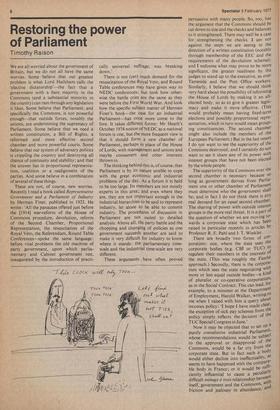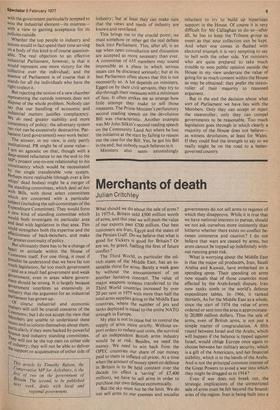Restoring the power of Parliament
Timothy Raison
We are all worried about the government of Britain, but we do not all have the same worries. Some believe that our greatest problem is what Lord Hai!sham calls the 'elective dictatorship'—the fact that a government with a bare majority in the Commons (and a substantial minority in the country) can ram through any legislation it likes. Some believe that Parliament, and specifically the Commons, is not powerful enough—that outside forces, notably the unions, are undermining the supremacy of Parliament. Some believe that we need a written constitution, a Bill of Rights, a reformed and more effective second chamber and more powerful courts. Some believe that our system of adversary politics is crippling the country and destroying all chance of continuity and stability; and that the answer lies in proportional representation, coalition or a realignment of the parties. And some believe in a combination of several of these things.
These are not, of course, new worries. Recently I read a book called Representative Government and a Parliament of Industry by Herman Finer, published in 1923. He wrote: 'All the panaceas offered just before the [1914] war-reform of the House of Commons procedure, devolution, reform of the Second Chamber, Proportional Representation, the resuscitation of the Royal Veto, the Referendum, Round Table Conferences—spoke the same language: before vital problems the old machine of party government, upon which • parliamentary and Cabinet government rest, inaugurated by the introduction of practi
cally universal suffrage, was breaking down.'
There is not (yet) much demand for the resuscitation of the Royal Veto, and Round Table conferences may have given way to NEDC conferences; but look how otherwise the battle cries are the same as they were before the First World War. And look how the specific subject matter of Herman Finer's book—the case for an industrial Parliament—has once more come to the fore. It takes different forms: Mr Heath's October 1974 notion of NEDC as a national forum is one, but .the more frequent view is that it should form a new chamber of Parliament, perhaps in place of the House of Lords, with management and unions and maybe consumers and other interests thrown in.
The thinking behind this is, of course, that Parliament is by its nature unable to cope with the great economic and industrial problems of the day. As a forum it is held to be too large. Its members are not mostly experts in this area; and even where they are, they are not important enough in the industrial hierarchies to be said to represent industry, let alone to be able to commit industry. The procedures of discussion in Parliament are not suited to detailed analysis. Above all, the party battle and the chopping and changing of policies as one government succeeds another are said to make it very difficult for industry to know where it stands: the parliamentary timescale and the industrial time-scale are very different.
These arguments have often proved
persuasive with many people. So, too, has the argument that the Commons should be cut down to size and the checks and balances to it strengthened. There may well be a case for strengthening the checks. 1 am not against the steps we are seeing in the direction of a written constitution (notably through membership of the EEC and the requirements of the devolution scheme); and I welcome what may prove to be more significant, the greater readiness by the judges to stand up to the executive, as over Tameside and the Post Office workers. Similarly, I believe that we should think very hard about the possibility of reforming the House of Lords by making it an allelected body, so as to give it greater legitimacy and make it more effective. (This would probably mean having fixed-term elections and possibly proportional representation, which in turn would mean grouping constituencies. The second. chamber might also include the members of the European Parliament.) But in the last resort
do not want to see the superiority of the Commons destroyed; and I certainly do not want to sec it share any of its power with interest groups that have not been elected by the whole people.
The superiority of the Commons over the second chamber is necessary because so long as government derives from Parliament one or other chamber of Parliament must determine who the government shall be; and in fact I do not think there is anY real demand for an equal second chamber. The sharing of power with outside interest groups is the more real threat. It is a part of the question of whether we are moving towards a corporate state which has be raised in particular recently in articles bY Professor R. E. Pahl and J. T. Winkler.
There are broadly two forms of corporatism: one, where the state uses the corporate bodies (e.g. CBI or TUC) t° regulate their members in the interests of the state. (This was roughly the Fascist approach.) Secondly, there is the corporatism which sees the state negotiating with more or less equal outside bodies—a kind of pluralist or co-operative corporatism, as in the Social Contract. This can lead, for example, to a minister at the Department of Employment, Harold Walker, writing to me when I raised with him a query about incomes policy: 'I hope I have made clear, the exception of sick pay schemes from the policy simply reflects the decision of the TUC Special Congress in June.' Now it may be objected that to set UP 3 purely consultative industrial Parliament, whose recommendations would be subject to the approval or disapproval of the Commons, would be a far cry from the
corporate state. But in fact such a bodY
would either decline into i asneffectuality, seems to have happened with the comParable body in France; or it would be sufficiently influential to cause a peculiarlY difficult menage a trois relationship betwee.ri Spectator 5 February 1977 With the government particularly tempted to WOO the industrial element—its mistress— with a view to gaining acceptance for its Policies outside.
Whether the top people in industry and
unions would in fact spend their time serving on a body of this kind is of course question
able. The real objection to an effective industrial Parliament, however, is that it would represent one more victory for the collective over the individual; and the essence of Parliament is of course that it stands for all the individuals who have the right to elect it.
But rejecting the notion of a new chamber representing the outside interests does not dispose of the whole problem: Nobody can
say that our handling of economic and
industrial matters justifies complacency. We do need greater stability and more consistency of policy; the adversary system run riot can be excessively destructive. Parliament (and government) must work better. The answer, in my view, is only partly institutional. PR might be of some value— am an agnostic on that, though with a deeP-seated reluctance to gee the end to the Present one-to-one relationship to his constituency which would be necessitated bY the single transferable vote system.
Perhaps more realisable (though over a few Whips' dead bodies) might be a merger of
the standing committees, which deal ad hoc
With Bills, with those select committees which are concerned with a particular
subject (including the sub-committees of the Expenditure Committee). They would form a new kind of standing committee which Would both investigate its particular area and deal with legislation in that area. This could strengthen both the expertise and the !ffectiveness of back-benchers, and make l°r greater continuity of policy.
Rut ultimately there has to be a change of :!,eart or attitude within the House of
'ommons itself. For one thing, it must if Possible be understood that we have far too much legislation, far too much government —and as a result bad government and weak government, even in areas where governrnent should be strong. It is largely because government interferes so extensively in industry that the argument for an industrial Parliament has grown up. Of course industrial and economic ,Matters will still be crucial concerns of the rrimons; but 1 do not accept the view that rembers are unable to understand these ssues and to inform themselves about them, k3arlicularly if they were backed by powerful Tilhance and industry standing committees. ofFY will not be the top men on either side th Industry; they will not be able to deliver e suPport or acquiescence of either side of
industry; but at least they can make sure that the views and needs of industry are known and ventilated.
This brings me to the crucial point; we must somehow or other get the real debate back into Parliament. This, after all, is an age when open consultation and discussion are accepted as more necessary than ever. A committee of 635 members may sound impossible as a place in which serious issues can be discussed seriously; but at its best Parliament often shows that this is not necessarily so. A lot depends on ministers. Egged on by their civil servants, they try to slip through their measures with a minimum of fuss. It often strikes me as strange how little attempt they make to sell those measures. The Prime Minister's perfunctory second reading speech on the devolution Bill was characteristic. Another example was Mr John Silkin's second reading speech on the Community Land Act where he lost the initiative at the start by failing to reason out the case for the Bill. Yes, he got his Bill in the end; but nobody much believes in it.
Ministers also seem astonishingly
reluctant to try to build up bipartisan support in the House. Of course it is very difficult for Mr Callaghan to do so—after all, he has to keep the Tribune group as sweet as that sour collection can be kept. And when one comes in flushed with electoral triumph it is very tempting to say to hell with the other side. Yet ministers who are quite prepared to take much trouble to woo public opinion outside the House in my view underrate the value of going for as much consent within the House as may be obtained: they prefer the steamroller of their majority to reasoned argument. But in the end the decision about what sort of Parliament we have lies with the Members. Only they can accept or reject the steamroller; only they can compel governments to be reasonable. Too much legislation goes through in which clearly a majority of the House does not believe— as witness devolution, at least for Wales. If they could find the strength to say so we really might be on the road to a bettergoverned country.



































 Previous page
Previous page